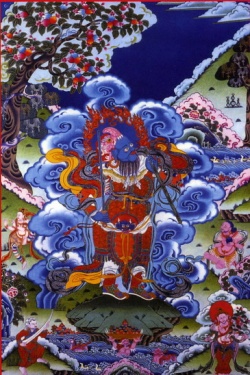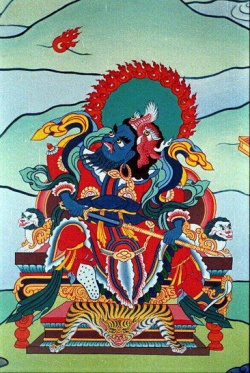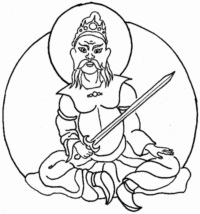Difference between revisions of "Virudhaka"
(Created page with "thumb|250px| <poem> '''Virudhaka''' (Skt) (1) [波瑠璃王] (Pali Vidudabha; Jpn Haruri-o) A king of the state of Kosala in India during Shakyamu...") |
|||
| (5 intermediate revisions by 2 users not shown) | |||
| Line 1: | Line 1: | ||
| − | [[ | + | [[Image:VirudhakaTST.jpg|frame|Virudhaka]] |
| − | + | '''[[Virudhaka]]''' (Skt. ''[[Virūḍhaka]]''; Tib. ''[[Pak Kyepo]]''; [[Wyl.]] '' [['phags skyes po]]''; Eng. '[[Noble Birth]]') — one of the [[Four Great Kings]]. [[Guardian King]] of the '''[[South]]''' and leader of the [[kumbhandas]], fierce [[beings]] who reside in the [[desire realms]] of the [[heavens]]. | |
| − | '''Virudhaka''' (Skt | ||
| − | [ | ||
| − | + | [[Virudhaka]], along with the other [[guardian kings]], protected [[Mayadevi|Buddha Shakyamuni's mother]] before the {{Wiki|prince}} was born and continued to assist him during his [[lifetime]]. Today he protects [[beings]] who have led a [[virtuous]] [[life]] from [[Yama]], the [[Lord of Death]], and uses his power to ward off anything that would disrupt the [[Dharma]]. | |
| − | + | Because his {{Wiki|touch}} is harmful to [[beings]] he carries a sword to prevent them from approaching him. | |
| + | |||
| + | ==Further Reading== | ||
| + | {{Nolinking|*''Crystal Mirror, volume VI'', Dharma Publishing 1984}} | ||
| + | {{RigpaWiki}} | ||
| + | {{NewSourceBreak}} | ||
| + | [[File:Virudhaka-zt3.jpg|thumb|250px|]][[File:Virudhaka0011.jpg|thumb|250px|]] | ||
| + | [[Virudhaka]] (IAST: [[Virūḍhaka]], [[Pali]]: [[Viḍūḍabha]], {{Wiki|Nepali}}: [[विरूढक]]) was son of [[Raja Prasenjit]] and [[king]] of [[Kashi]] [[Kosala]]. | ||
| + | |||
| + | Soon after usurping the [[prosperous]] {{Wiki|kingdom}} built up by his father [[Bimbisara]], the {{Wiki|parricide}} [[Ajatashatru]] (ruled 491-461 BCE) went to [[war]] with his aged uncle [[Prasenjit]], and gained complete control of [[Kashi]]. Just after this [[Prasenjit]], like [[Bimbisara]], was deposed by his son, and [[died]]. The new [[king]], [[Virūḍhaka]] (in [[Pali]] [[Viḍūḍabha]]), then attacked and virtually annihilated the little autonomous tribe of [[Shakyas]] and {{Wiki|Koliyas}} , in {{Wiki|Himalyan}} foothills, and we hear no more of the [[people]] which produced one of the greatest of {{Wiki|Nepalese}}, the [[Buddha]]. | ||
| + | |||
| + | Probably [[Virudhaka]], like {{Wiki|Ajatashatru}} of [[Magadha]], had [[ambitions]] of {{Wiki|empire}}, and wished to embark on a career of conquest after bringing the outlying peoples, who had paid loose homage to his father, more directly under the control of the centre; but his {{Wiki|intentions}} were unfulfilled, for we hear no more of him except an unreliable legend that he was destroyed by a [[miracle]] soon after his massacre of [[Shakyas]]. A little later his {{Wiki|kingdom}} was incorporated in [[Magadha]]. | ||
| + | |||
| + | {{W}} | ||
| + | {{NewSourceBreak}} | ||
| + | [[Virudhaka]](Skt) (1)<br/> | ||
| + | [[波瑠璃王]] ([[Pali]] [[Vidudabha]]; Jpn [[Haruri-o]]) | ||
| + | |||
| + | A [[king]] of the state of [[Kosala]] in [[India]] during [[Shakyamuni's]] [[lifetime]]. His father was [[Prasenajit]]. According to the Increasing by One [[Agama Sutra]], when [[Prasenajit]] ascended the [[throne]], he wanted to take a [[consort]] from the [[Shakya tribe]] and had his wish conveyed to the [[Shakyas]] in [[Kapilavastu]]. The [[Shakyas]] were held to be of [[noble]] [[lineage]]. A [[Shakya]] named [[Mahanama]] conceived a plan to offer his maidservant's daughter, a beautiful woman, to the [[king]] in [[marriage]], claiming that the daughter was his own. [[Prasenajit]] accepted, and together they had a son, [[Virudhaka]]. When [[Virudhaka]] was eight years old, [[Prasenajit]] sent him to [[Kapilavastu]] to have him learn [[archery]] from the [[Shakyas]]. While there, [[Virudhaka]] was ridiculed as the son of a maidservant; thus {{Wiki|learning}} of his lowly [[birth]] and that his father had been deceived, he [[vowed]] to take revenge on the [[Shakyas]]. Later, upon succeeding to the [[throne]] after [[Prasenajit's]] [[death]], he immediately led an {{Wiki|army}} against [[Kapilavastu]], destroying the [[Shakya]] {{Wiki|kingdom}}. According to the [[sutra]], seven days later, as the [[Buddha]] had predicted, a [[violent]] storm with heavy [[rain]] came up suddenly during the night, and [[Virudhaka]] and his [[warriors]], who had been staying by the riverside, drowned, falling into the [[hell of incessant suffering]]. According to The [[Monastic Rules]] on Various Matters, while [[Prasenajit]] was away from the capital, [[Shravasti]], [[Virudhaka]] usurped the [[throne]]. Informed of this, [[Prasenajit]] made his way to [[Rajagriha]], the capital of [[Magadha]] under [[Ajatashatru's]] rule. After he arrived there, however, he became seriously ill and [[died]]. Soon after, [[Virudhaka]] massacred the majority of the [[Shakya tribe]], taking revenge for the {{Wiki|humiliation}} he had [[suffered]] as a youth. | ||
| + | -------- | ||
| + | (2) [増長天](Jpn [[Zojo-ten]] or [[Zocho-ten]]): The [[heavenly king]] Increase and Growth. One of the [[four heavenly kings]]. | ||
| + | |||
| + | ==See Also== | ||
| + | * [[Increase and Growth]] | ||
| − | |||
| − | |||
{{R}} | {{R}} | ||
| − | [http://www.sgilibrary.org/search_dict.php? | + | [http://www.sgilibrary.org/search_dict.php?id=2608 sgilibrary.org] |
| − | [[ | + | {{NewSourceBreak}} |
| − | [[Category: | + | [[Virudhaka]] ([[Tibetan]]: [[pag pi kye bo]]), Guardian of the Southern [[Direction]] and [[King]] of the [[Kumbhanda]]. |
| + | |||
| + | Regal in stature, blue in {{Wiki|colour}}, he has a full face with black eyebrows, moustache and beard. Large bulbous [[eyes]] gaze to the side. The right hand holds at the waist a long sword with the left cradling the blade across the {{Wiki|chest}}. Adorned with an ornate headdress of {{Wiki|gold}} and [[jewels]], earrings and ribbons, he is richly garbed in the brocade raiment of a [[king]], opulent with silks and elaborate design in a variety of colours. Seated on a light brown deerskin mat above a rocky bench, in a [[relaxed]] [[posture]] and wearing boots, the right foot is extended pressing on the back of a golden [[turtle]]. The left foot is held up by a [[Kumbhanda]] daemon, green and pink of {{Wiki|colour}}, in an acquiescent kneeling [[posture]]. The head is encircled by an irregular dark green {{Wiki|areola}} edged with licks of flame in various colours. The background is filled with swirling smoke, dark purple, and the foreground sparse and green. | ||
| + | |||
| + | [[Virudhaka]], leader of the [[Kumbhanda]], is a [[worldly]] guardian worshipped as a [[protector]]. He [[lives]] on the [[south]] side of the lower slopes of [[mount Meru]] in the [[Heaven of the Four Great Kings]]. Like the other [[Direction Kings]], the leader [[Vaishravana]], [[Virupaksha]] and [[Dritarashtra]], he swore an oath of [[protection]] before the [[buddha]] [[Shakyamuni]]. The stories and {{Wiki|iconography}} of the [[Four Guardian Kings]] arose originally with the early [[Buddhist sutras]] and became fully developed in the later [[Mahayana sutras]]. They are common to all [[schools of Tibetan Buddhism]]. Paintings of the [[Kings]] are generally found in association with a larger thematic set featuring the [[buddha]] [[Shakyamuni]] and the [[16 Great Arhats]]. | ||
| + | |||
| + | {{R}} | ||
| + | [http://www.himalayanart.org/image.cfm/172.html himalayanart.org] | ||
| + | {{NewSourceBreak}} | ||
| + | His {{Wiki|Chinese}} [[name]] is [[Mo-Li Hung]], and he is associated with the {{Wiki|Hindu}} [[god]] [[Yama]], the [[god of death]] and the {{Wiki|Underworld}}. He is [[King of the South]], where he [[lives]] in a palace made of glass and rules over the [[Jambudvipa]] continent. He is known as "The [[One Who Enhances Virtue]]," using his Sword of [[Wisdom]] to control [[evil]]. Sometimes called "The [[Enhancement Heavenly King]]," by controlling [[evil]] he enhances or improves the [[lives]] of all [[sentient beings]]. | ||
| + | |||
| + | He is also [[King]] of the [[Kumbhandas]], ({{Wiki|demons}} shaped like {{Wiki|gourds}}, or with a scrotum like one, and who drain the [[vitality]] of men) a kind of gourd-shaped {{Wiki|demon}}. Sometimes he is depicted trampling a {{Wiki|demon}} under foot, representing the control of [[evil]], but also reminding us that all of these [[Kings]] have a [[wrathful]] aspect. The control of [[evil]] can be a messy business. His [[Sanskrit]] [[name]] "[[Virudhaka]]" indicates "[[growing large]]," with an overtone of bringing {{Wiki|prosperity}}. | ||
| + | |||
| + | {{R}} | ||
| + | [http://mi-le-fo.thetempleguy.com/ascent/174kings.htm mi-le-fo.thetempleguy.com] | ||
| + | |||
| + | {{NewSourceBreak}} | ||
| + | [[King]] [[Virudhaka]]. [[Guardian of the South]] and leader of the [[kumbhandas]], fierce [[beings]] who reside in the [[desire realms]] of the [[heavens]]. Formerly a [[garuda]], he converted along with [[Virudhaka]]. Today he protects [[beings]] who have led a [[virtuous]] [[life]] from [[Yama]], the [[Lord of Death]], and uses his power to ward off anything that would disrupt the [[Dharma]]. His {{Wiki|touch}} is harmful to [[beings]] so he carries a sword to keep them at bay. | ||
| + | |||
| + | {{R}} | ||
| + | [http://www.pinterest.com/ogmin/the-four-guardian-kings/ pinterest.com] | ||
| + | {{NewSourceBreak}} | ||
| + | [[File:Virudhaka.jpg|frameless|left|250px|]] | ||
| + | |||
| + | [[King of the South]]. Green in {{Wiki|colour}} and holding a sword. [[King]] of the [[Kumbhāṇḍas]], his [[name]] means "ever growing". | ||
| + | |||
| + | The [[Kumbhāṇḍas]] according to Sutherland are "a grotesque group of {{Wiki|demons}} with testicles in the shape of a [[kumbha]] or pitcher". The [[Pāli]] commentaries describe them as having "huge stomachs, and their {{Wiki|genital}} {{Wiki|organs}} were as big as pots, hence their [[name]]". (DA.iii.964) <br/> | ||
| + | |||
| + | [[File:Virudhakamantra.png|frameless|450px|]]<br/> | ||
| + | |||
| + | '''[[oṃ]] vi rū ḍha ka [[kuṃ]] bhāṃ ḍā dhi pa ta ye svā hā | ||
| + | |||
| + | '''[[oṃ]] [[virūḍhaka]] kumbhāṇḍādhipataye [[svāhā]] | ||
| + | |||
| + | "[[virūḍhaka kumbhāṇḍāye]]" can be translated [[Virūḍhaka Lord of the Kumbhāṇḍas]]. [[Bonji]] Taikan has "[[yakṣādhipataye]]" but properly {{Wiki|speaking}} [[Vaiśravaṇa]] is [[Lord]] of the [[Yakṣas]], and [[Virūḍhaka]] is [[Lord]] of the [[Kumbhāṇḍas]]. | ||
| + | |||
| + | {{R}} | ||
| + | [http://www.visiblemantra.org/kings.html visiblemantra.org] | ||
| + | |||
| + | |||
| + | |||
| + | |||
| + | |||
| + | [[Category:Virudhaka]] | ||
Latest revision as of 11:14, 8 July 2014
Virudhaka (Skt. Virūḍhaka; Tib. Pak Kyepo; Wyl. 'phags skyes po; Eng. 'Noble Birth') — one of the Four Great Kings. Guardian King of the South and leader of the kumbhandas, fierce beings who reside in the desire realms of the heavens.
Virudhaka, along with the other guardian kings, protected Buddha Shakyamuni's mother before the prince was born and continued to assist him during his lifetime. Today he protects beings who have led a virtuous life from Yama, the Lord of Death, and uses his power to ward off anything that would disrupt the Dharma.
Because his touch is harmful to beings he carries a sword to prevent them from approaching him.
Further Reading
- Crystal Mirror, volume VI, Dharma Publishing 1984
Source
Virudhaka (IAST: Virūḍhaka, Pali: Viḍūḍabha, Nepali: विरूढक) was son of Raja Prasenjit and king of Kashi Kosala.
Soon after usurping the prosperous kingdom built up by his father Bimbisara, the parricide Ajatashatru (ruled 491-461 BCE) went to war with his aged uncle Prasenjit, and gained complete control of Kashi. Just after this Prasenjit, like Bimbisara, was deposed by his son, and died. The new king, Virūḍhaka (in Pali Viḍūḍabha), then attacked and virtually annihilated the little autonomous tribe of Shakyas and Koliyas , in Himalyan foothills, and we hear no more of the people which produced one of the greatest of Nepalese, the Buddha.
Probably Virudhaka, like Ajatashatru of Magadha, had ambitions of empire, and wished to embark on a career of conquest after bringing the outlying peoples, who had paid loose homage to his father, more directly under the control of the centre; but his intentions were unfulfilled, for we hear no more of him except an unreliable legend that he was destroyed by a miracle soon after his massacre of Shakyas. A little later his kingdom was incorporated in Magadha.
Source
Virudhaka(Skt) (1)
波瑠璃王 (Pali Vidudabha; Jpn Haruri-o)
A king of the state of Kosala in India during Shakyamuni's lifetime. His father was Prasenajit. According to the Increasing by One Agama Sutra, when Prasenajit ascended the throne, he wanted to take a consort from the Shakya tribe and had his wish conveyed to the Shakyas in Kapilavastu. The Shakyas were held to be of noble lineage. A Shakya named Mahanama conceived a plan to offer his maidservant's daughter, a beautiful woman, to the king in marriage, claiming that the daughter was his own. Prasenajit accepted, and together they had a son, Virudhaka. When Virudhaka was eight years old, Prasenajit sent him to Kapilavastu to have him learn archery from the Shakyas. While there, Virudhaka was ridiculed as the son of a maidservant; thus learning of his lowly birth and that his father had been deceived, he vowed to take revenge on the Shakyas. Later, upon succeeding to the throne after Prasenajit's death, he immediately led an army against Kapilavastu, destroying the Shakya kingdom. According to the sutra, seven days later, as the Buddha had predicted, a violent storm with heavy rain came up suddenly during the night, and Virudhaka and his warriors, who had been staying by the riverside, drowned, falling into the hell of incessant suffering. According to The Monastic Rules on Various Matters, while Prasenajit was away from the capital, Shravasti, Virudhaka usurped the throne. Informed of this, Prasenajit made his way to Rajagriha, the capital of Magadha under Ajatashatru's rule. After he arrived there, however, he became seriously ill and died. Soon after, Virudhaka massacred the majority of the Shakya tribe, taking revenge for the humiliation he had suffered as a youth.
(2) [増長天](Jpn Zojo-ten or Zocho-ten): The heavenly king Increase and Growth. One of the four heavenly kings.
See Also
Source
Virudhaka (Tibetan: pag pi kye bo), Guardian of the Southern Direction and King of the Kumbhanda.
Regal in stature, blue in colour, he has a full face with black eyebrows, moustache and beard. Large bulbous eyes gaze to the side. The right hand holds at the waist a long sword with the left cradling the blade across the chest. Adorned with an ornate headdress of gold and jewels, earrings and ribbons, he is richly garbed in the brocade raiment of a king, opulent with silks and elaborate design in a variety of colours. Seated on a light brown deerskin mat above a rocky bench, in a relaxed posture and wearing boots, the right foot is extended pressing on the back of a golden turtle. The left foot is held up by a Kumbhanda daemon, green and pink of colour, in an acquiescent kneeling posture. The head is encircled by an irregular dark green areola edged with licks of flame in various colours. The background is filled with swirling smoke, dark purple, and the foreground sparse and green.
Virudhaka, leader of the Kumbhanda, is a worldly guardian worshipped as a protector. He lives on the south side of the lower slopes of mount Meru in the Heaven of the Four Great Kings. Like the other Direction Kings, the leader Vaishravana, Virupaksha and Dritarashtra, he swore an oath of protection before the buddha Shakyamuni. The stories and iconography of the Four Guardian Kings arose originally with the early Buddhist sutras and became fully developed in the later Mahayana sutras. They are common to all schools of Tibetan Buddhism. Paintings of the Kings are generally found in association with a larger thematic set featuring the buddha Shakyamuni and the 16 Great Arhats.
Source
His Chinese name is Mo-Li Hung, and he is associated with the Hindu god Yama, the god of death and the Underworld. He is King of the South, where he lives in a palace made of glass and rules over the Jambudvipa continent. He is known as "The One Who Enhances Virtue," using his Sword of Wisdom to control evil. Sometimes called "The Enhancement Heavenly King," by controlling evil he enhances or improves the lives of all sentient beings.
He is also King of the Kumbhandas, (demons shaped like gourds, or with a scrotum like one, and who drain the vitality of men) a kind of gourd-shaped demon. Sometimes he is depicted trampling a demon under foot, representing the control of evil, but also reminding us that all of these Kings have a wrathful aspect. The control of evil can be a messy business. His Sanskrit name "Virudhaka" indicates "growing large," with an overtone of bringing prosperity.
Source
King Virudhaka. Guardian of the South and leader of the kumbhandas, fierce beings who reside in the desire realms of the heavens. Formerly a garuda, he converted along with Virudhaka. Today he protects beings who have led a virtuous life from Yama, the Lord of Death, and uses his power to ward off anything that would disrupt the Dharma. His touch is harmful to beings so he carries a sword to keep them at bay.
Source
King of the South. Green in colour and holding a sword. King of the Kumbhāṇḍas, his name means "ever growing".
The Kumbhāṇḍas according to Sutherland are "a grotesque group of demons with testicles in the shape of a kumbha or pitcher". The Pāli commentaries describe them as having "huge stomachs, and their genital organs were as big as pots, hence their name". (DA.iii.964)
oṃ vi rū ḍha ka kuṃ bhāṃ ḍā dhi pa ta ye svā hā
oṃ virūḍhaka kumbhāṇḍādhipataye svāhā
"virūḍhaka kumbhāṇḍāye" can be translated Virūḍhaka Lord of the Kumbhāṇḍas. Bonji Taikan has "yakṣādhipataye" but properly speaking Vaiśravaṇa is Lord of the Yakṣas, and Virūḍhaka is Lord of the Kumbhāṇḍas.




